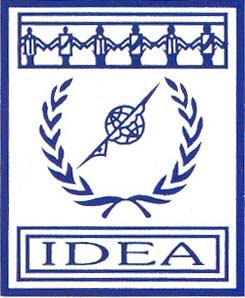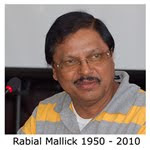Training cum Exposure Programme
The second training cum exposure programme of 40 community leaders and activists was held at Kolkata from November 11 to 19, 2008 which was organized by the Institute for Development Education and Action (IDEA) and Leaders and Organizers of Community Organization in Asia (LOCOA) and sponsored by SELAVIP. Around 21 delegates from over 10 organizations of Bangladesh attended the programme and 19 others from West Bengal and Kolkata representing 6 NGOs and CBOs. The programme evoked lot of interest and there were demands for conducting such trainings in Bangladesh and in India.
On the first two days (November 11 & 12), the delegates visited different tourist spot as well as slums and squatters settlements of the city to see for themselves the problems faced by the people. The visit-helped the trainees to understand the actual situation and see different facets of city life, specially the living conditions of poor people. The in-house training programme started on November 13. At the very outset, Dr. Goutam Niyogi, a historian, delved into the various phases of history of human beings before and after the birth of Christ and the social, political and economic changes brought about from time to time. The presentation tried to show the evolution of human beings and how the process of community started in society.
Another speaker on the first day of the programme was the eminent litterateur, Prof. Hossainur Rahman, who made an impassioned plea for fearlessness and courage and rising above fundamentalism and superstition, referring to Mahatma Gandhi who embraced the virtues of all religions. Man has to rise above petty religious thinking and in this context spoke about Chitanya who tried to synthesize Hinduism and Islam. He warned that the state and religion has been destroying the intrinsic value of man and the need of the hour is to develop the humane aspect of man for effective social transformation. Prof. Rahman also talked about ‘partyless democracy’ as propounded by Jayaprakash Narayan and the eventual withering away of parties which has now become embedded in corruption, malpractices and centralized decision making.
Mr. Rabial Mallick, who conducted the training and was the main speaker from the very first day, elaborated on the political, economic, social and cultural structures and how these have been misused against the interests of the poor and the underprivileged sections of society. The abuse of political power for financial gains, the growing corruption in the political domain and the unholy nexus between politicians and bureaucracy have forced common people to lose faith in the system, he said.
Regarding the economic structure, Mr. Mallick said the process of globalization and liberalization along with the growth in the GDP has benefited only a certain segment of society. According to him, industrial growth has not helped the common man because in this era of mechanization and automation, it has failed to create the necessary employment opportunities. On the other hand, income from agriculture, in which over 60 per cent of the working population are dependent, has steadily declined because of wrong policies of the government as also heavy subsidies in this sector by the Western countries.
Mr. Mallick pointed out that the number of people below the poverty line has increased in the Third World with the pressure in cities growing because of in-migration from the rural areas where there is very little growth. In most of the rural areas, the basic necessities of life specially education and health are lacking and this has forced the rural population to find shelter in the slums of cities. In fact, he said estimates indicate that Asian cities like Tokyo, Mumbai, Delhi and Dhaka would more than double by 2025.
On November 14, the participants were divided into five groups who were asked to give their views on (i) the different structures and its effect, (ii) the reason for having to stay within the orbit of these structures and (iii) the strategy to remove poverty and unemployment in the country. Though there was some confusion among the groups, the usual answers were forthcoming.
Ms. Jesmen Akthar of Shelter for the Poor and the leader of one of the groups enumerated the drawbacks of the political, economic and social systems. The group specifically referred to the districts in the rural areas and the low returns from agriculture with the poor slowly becoming incapable to fight for their justified demands and rights. An important point made by the group was that religious superstitions have come in the way of social progress.
Ms. Jesmen blamed the government for not looking at these problems and suggested the need for evolving an alternative strategy of development. Among the group suggestions were: (i) development of small and cottage industries, (ii) correcting wage disparity, (iii) impetus to small business in various ways, (iv) imparting quality and skilled education, and (v) population control.
Other presentation of the other groups harped more or less on the same points. The question of population control, spread of education, land ownership in the hands of a few, lack of employment opportunities and growing inequality in society were emphasized by the other groups. The need for decentralization of political and economic power and a more important role for women in society were emphasized by the group leaders.
After lunch, Dr. S. S. Bala, Zonal Head of the Central Pollution Control Board (CPCB) pointed to the growing pollution in drinking water, specially in slum areas of various cities, including Kolkata. He discussed the need for waste management, including industrial waste, hospital waste and toxic waste, and setting up of sewage treatment plants for awareness generation and making the poor conscious in this regard. Several participants from Bangladesh talked of pollution in Buri Ganga because of sewage from tanneries, paper mills and dye plants and pitiable conditions of the people living in both sides of this highly polluted river.
On the third day (November 15), Mr. Mallick discussed the ten steps regarding formation of community based peoples’ organizations. Starting with the integration process, he talked of social investigation, understanding the specific problems of the community, starting awareness generation, agitate people during analyzing the issues, discussions and dialogue, motivating people to resist and take up the problems, mobilization, evaluation, deep analysis and drawing up future plan of action and ultimately developing people’s organization.
Mr. Dhurjati Mukherjee, Jt. Secretary of the State Habitat & Environment Forum (SHEF), in his presentation, harped on the environmental factor, which has become quite critical today. Referring to the all-round increase in air, water and soil pollution, he said this has disastrous impact on human health and it is always the poorer sections who suffer the most. Mr. Mukherjee said that arsenic pollution, which has affected most districts in India and Bangladesh, has attracted world-wide attention, affecting lakhs of people. Regarding the impending water crisis and its global impact, he said this may affect food production and productivity in India in the next 10 years or so.
The last speaker of the day was Prof. Imanul Haq, Human Rights Activist who showed how innovative and courageous Bengalis were in the past. He discussed how the Zamindar (landlords) class was created, trade came to be restricted and the British started looting the economic wealth of the Bengalis.
On November 16, Mr. Mallick continued his discussions on ways and means of strengthening the community and ensuring that it remained non political and free from religious influences and truly geared to serve the interests of the community. A point made by him was that the community leader has to educate himself about prevalent rules and regulations so that these could be used in favour of getting the needs and demands of the poor.
Two well presented dramas, one title ‘Rules of the Games’ and the other ‘Jago’ were staged by Chorus Ekashi and Howrah Dalit Forum respectively. With the first showing how the business community has restored to unethical means to grab power and exploit the dalits while the other portrayed discrimination against girls in life and society.
Interaction with NGOs:
On November 17, the group visited a rural area (Deora village) in Howrah district for a field visit and becoming acquainted with problems of rural areas and the work done by IDEA in organizing and empowering the community there.
On the final day November 18, Mr. Rabial Mallick deliberated on the role of community leaders and community organizers, specially in the new millennium and the emerging challenges facing them in working with the community and motivating them to fight against all forms of injustice. In the evening, the participants both from Bangladesh and also from West Bengal gave their impressions about the training and the field visits in Kolkata and Howrah cities and in the rural areas of Howrah district. An important point was made by Mr. Kaizer Alam who said that such trainings should be conducted in Bangladesh (at least twice a year) to equip the various community leaders to tackle the various types of problems faced by them in organizing the people.
The interaction between the Bangladesh delegates and leaders and community organizers of different NGOs working in an around Kolkata. At the very outset, Ms. Jesmin Aktar of Shelter for the Poor who said that the conditions of the poor in Bangladesh were indeed distressing and referred to medium quality rice which was priced at around Rs. 35. Moreover eviction has been increasing since 2001 and rehabilitation has become a major problem. She said that the NGOs with their limited resources have been trying to provide shelter and also unite the poor. Mr. Kazir Alam of Ruli Foundation spoke about corruption in the political life of his country while also talking about eviction of the poor and the street vendors. He also agreed with Ms. Jesmin about the phenomenal price rice of essential commodities like rice, oil etc.
From the India side, Md. Alamgir of Tiljala Society for Human & Educational Development and UBDA, referred to the limited power of the NGOs in fighting for the justified demands of the poor and the shelter less. He pointed out that it is often said at workshops and meetings to adopt a ‘right-based approach’ which is very difficult to implement.
Ms. Shampa Roy of Trinita Society for Social & Health Research observed that networking and unity are vital for NGOs to carry out their work. In this connection, she also said that finance is a big problem as government funds are not available in time and most NGOs are dependent on foreign grants. According to her, the thrust of NGO work should be on empowerment of women through spread of education and skilled training so as to enable them to come out into the mainstream of life and activity.
The leader of Hawker Sangram Committee, Mr. Shaktiman Ghosh, differed with Md. Alamgir. He said there was need for organized movement in a ‘fighting spirit’ to realize the demands of the poor. Mr. Ghosh visualized that, as per plans drawn up by USAID, World Bank and the Asian Development Bank (SDB), there will be no slums in cities and all these people will be evicted. Thus, he emphasized the need of mobilizing people with ‘the spirit of revolt’ and also said training was needed on how to prepare people to put up resistance against eviction.
Mr. Dhurjati Mukherjee of SHEF, in his concluding observations, observed the need for maintaining peace and harmony in society so that the government could concentrate on infrastructure development, specially in the areas of education, health, sanitation as also building roads and bridges for faster rural development. For an alternative strategy of development to become effective, he said, that sacrifice has become necessary not only of politicians but also of the people in general. Referring to Mahatma Gandhi, Mr. Mukherjee said that he believed in self-suffering to organize the masses.
Later certificates were handed over to all the participants by Mr. Mallick, Mr. Mukherjee and Mr. Al. Beeroonee of Shelter for the Poor.




